Implications of Discrimination in Employment Law: A Case Study of XYZ Company
VerifiedAdded on 2023/06/04
|12
|4464
|95
AI Summary
This article discusses the implications and possible defences to the implications as a result of the XYZ company decisions affecting their employees or will-be employees. It covers legal risks, defences available for XYZ, and the core principles of employment law.
Contribute Materials
Your contribution can guide someone’s learning journey. Share your
documents today.

Employment law
Student name
Institution
Student name
Institution
Secure Best Marks with AI Grader
Need help grading? Try our AI Grader for instant feedback on your assignments.
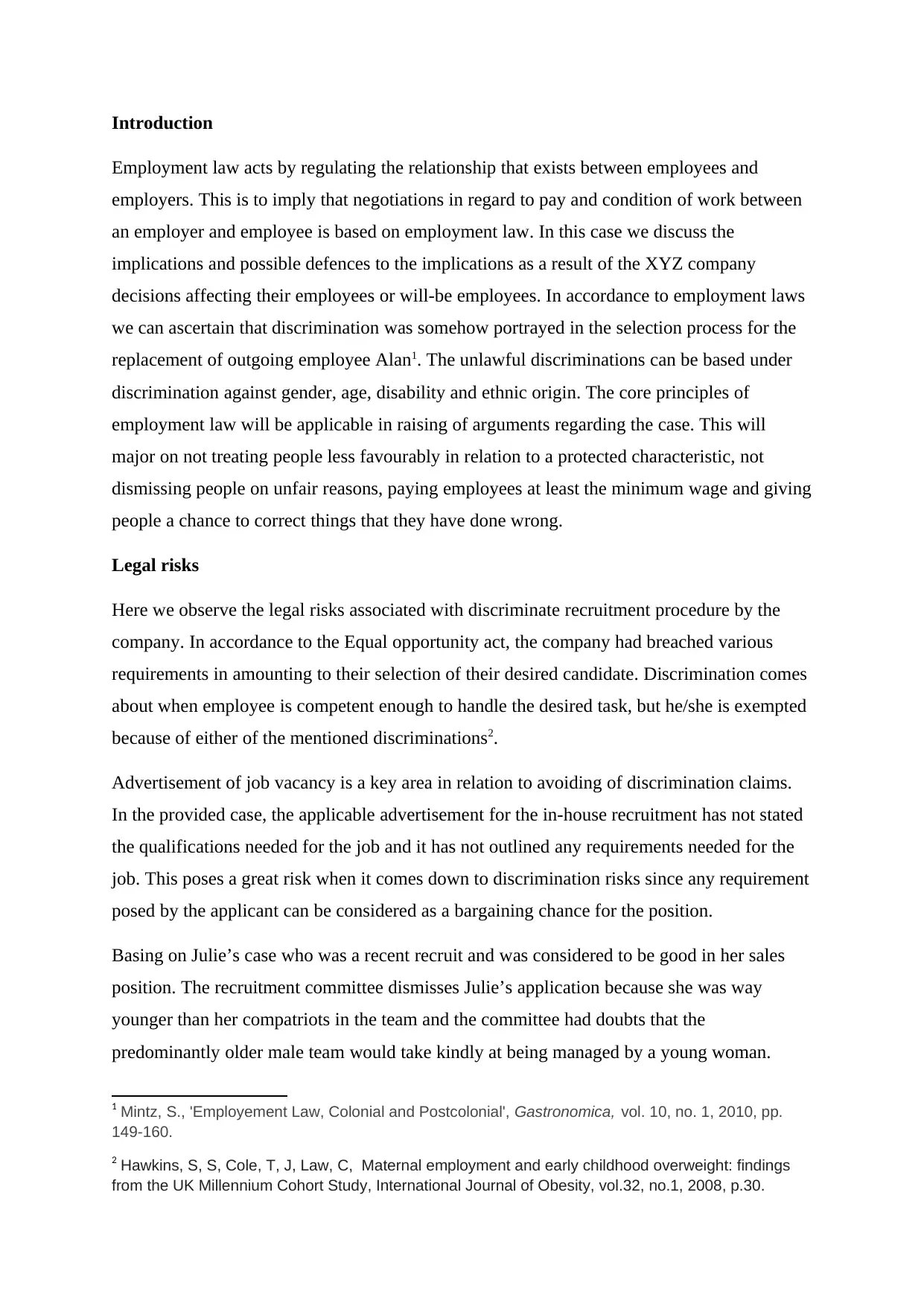
Introduction
Employment law acts by regulating the relationship that exists between employees and
employers. This is to imply that negotiations in regard to pay and condition of work between
an employer and employee is based on employment law. In this case we discuss the
implications and possible defences to the implications as a result of the XYZ company
decisions affecting their employees or will-be employees. In accordance to employment laws
we can ascertain that discrimination was somehow portrayed in the selection process for the
replacement of outgoing employee Alan1. The unlawful discriminations can be based under
discrimination against gender, age, disability and ethnic origin. The core principles of
employment law will be applicable in raising of arguments regarding the case. This will
major on not treating people less favourably in relation to a protected characteristic, not
dismissing people on unfair reasons, paying employees at least the minimum wage and giving
people a chance to correct things that they have done wrong.
Legal risks
Here we observe the legal risks associated with discriminate recruitment procedure by the
company. In accordance to the Equal opportunity act, the company had breached various
requirements in amounting to their selection of their desired candidate. Discrimination comes
about when employee is competent enough to handle the desired task, but he/she is exempted
because of either of the mentioned discriminations2.
Advertisement of job vacancy is a key area in relation to avoiding of discrimination claims.
In the provided case, the applicable advertisement for the in-house recruitment has not stated
the qualifications needed for the job and it has not outlined any requirements needed for the
job. This poses a great risk when it comes down to discrimination risks since any requirement
posed by the applicant can be considered as a bargaining chance for the position.
Basing on Julie’s case who was a recent recruit and was considered to be good in her sales
position. The recruitment committee dismisses Julie’s application because she was way
younger than her compatriots in the team and the committee had doubts that the
predominantly older male team would take kindly at being managed by a young woman.
1 Mintz, S., 'Employement Law, Colonial and Postcolonial', Gastronomica, vol. 10, no. 1, 2010, pp.
149-160.
2 Hawkins, S, S, Cole, T, J, Law, C, Maternal employment and early childhood overweight: findings
from the UK Millennium Cohort Study, International Journal of Obesity, vol.32, no.1, 2008, p.30.
Employment law acts by regulating the relationship that exists between employees and
employers. This is to imply that negotiations in regard to pay and condition of work between
an employer and employee is based on employment law. In this case we discuss the
implications and possible defences to the implications as a result of the XYZ company
decisions affecting their employees or will-be employees. In accordance to employment laws
we can ascertain that discrimination was somehow portrayed in the selection process for the
replacement of outgoing employee Alan1. The unlawful discriminations can be based under
discrimination against gender, age, disability and ethnic origin. The core principles of
employment law will be applicable in raising of arguments regarding the case. This will
major on not treating people less favourably in relation to a protected characteristic, not
dismissing people on unfair reasons, paying employees at least the minimum wage and giving
people a chance to correct things that they have done wrong.
Legal risks
Here we observe the legal risks associated with discriminate recruitment procedure by the
company. In accordance to the Equal opportunity act, the company had breached various
requirements in amounting to their selection of their desired candidate. Discrimination comes
about when employee is competent enough to handle the desired task, but he/she is exempted
because of either of the mentioned discriminations2.
Advertisement of job vacancy is a key area in relation to avoiding of discrimination claims.
In the provided case, the applicable advertisement for the in-house recruitment has not stated
the qualifications needed for the job and it has not outlined any requirements needed for the
job. This poses a great risk when it comes down to discrimination risks since any requirement
posed by the applicant can be considered as a bargaining chance for the position.
Basing on Julie’s case who was a recent recruit and was considered to be good in her sales
position. The recruitment committee dismisses Julie’s application because she was way
younger than her compatriots in the team and the committee had doubts that the
predominantly older male team would take kindly at being managed by a young woman.
1 Mintz, S., 'Employement Law, Colonial and Postcolonial', Gastronomica, vol. 10, no. 1, 2010, pp.
149-160.
2 Hawkins, S, S, Cole, T, J, Law, C, Maternal employment and early childhood overweight: findings
from the UK Millennium Cohort Study, International Journal of Obesity, vol.32, no.1, 2008, p.30.
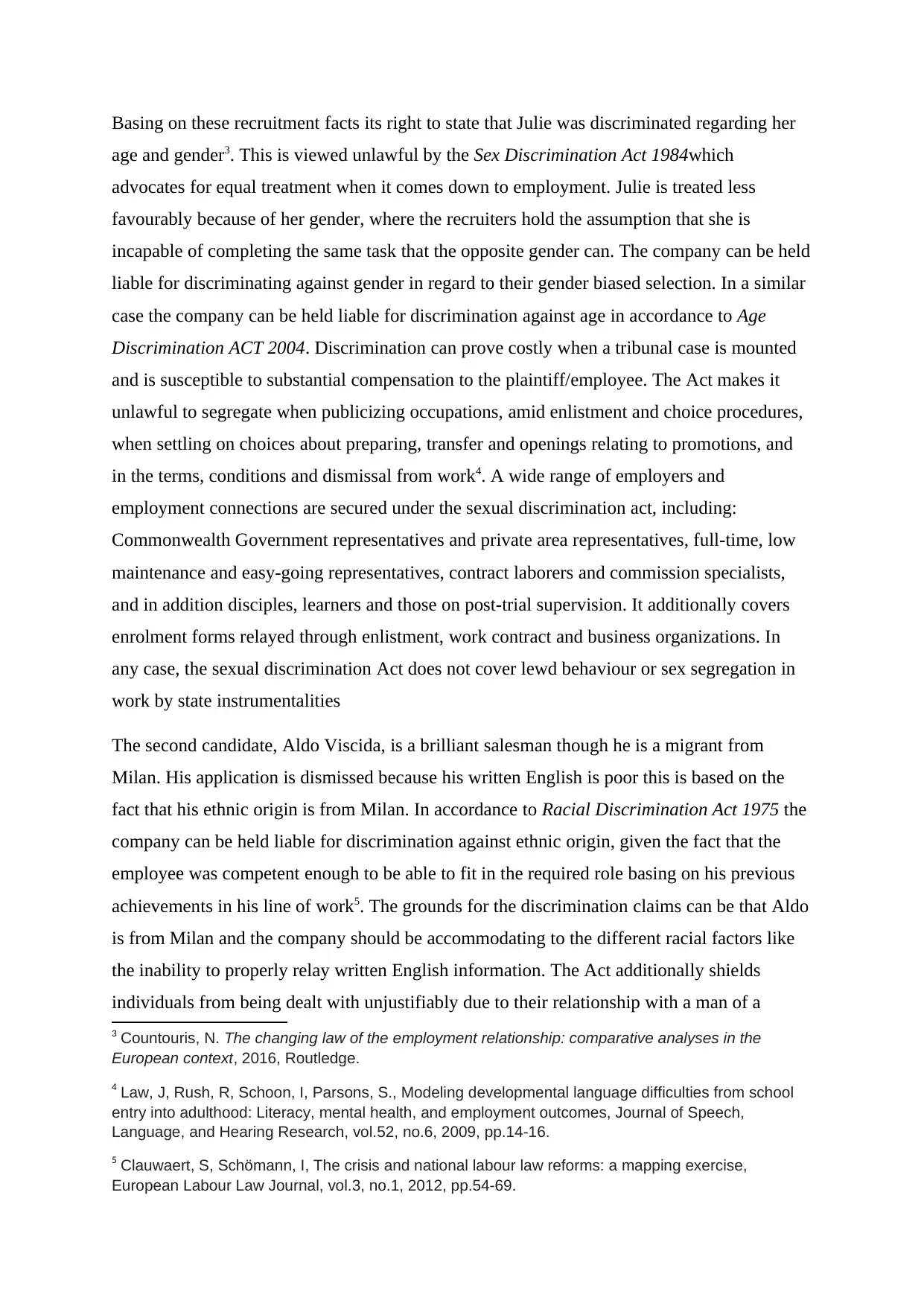
Basing on these recruitment facts its right to state that Julie was discriminated regarding her
age and gender3. This is viewed unlawful by the Sex Discrimination Act 1984which
advocates for equal treatment when it comes down to employment. Julie is treated less
favourably because of her gender, where the recruiters hold the assumption that she is
incapable of completing the same task that the opposite gender can. The company can be held
liable for discriminating against gender in regard to their gender biased selection. In a similar
case the company can be held liable for discrimination against age in accordance to Age
Discrimination ACT 2004. Discrimination can prove costly when a tribunal case is mounted
and is susceptible to substantial compensation to the plaintiff/employee. The Act makes it
unlawful to segregate when publicizing occupations, amid enlistment and choice procedures,
when settling on choices about preparing, transfer and openings relating to promotions, and
in the terms, conditions and dismissal from work4. A wide range of employers and
employment connections are secured under the sexual discrimination act, including:
Commonwealth Government representatives and private area representatives, full-time, low
maintenance and easy-going representatives, contract laborers and commission specialists,
and in addition disciples, learners and those on post-trial supervision. It additionally covers
enrolment forms relayed through enlistment, work contract and business organizations. In
any case, the sexual discrimination Act does not cover lewd behaviour or sex segregation in
work by state instrumentalities
The second candidate, Aldo Viscida, is a brilliant salesman though he is a migrant from
Milan. His application is dismissed because his written English is poor this is based on the
fact that his ethnic origin is from Milan. In accordance to Racial Discrimination Act 1975 the
company can be held liable for discrimination against ethnic origin, given the fact that the
employee was competent enough to be able to fit in the required role basing on his previous
achievements in his line of work5. The grounds for the discrimination claims can be that Aldo
is from Milan and the company should be accommodating to the different racial factors like
the inability to properly relay written English information. The Act additionally shields
individuals from being dealt with unjustifiably due to their relationship with a man of a
3 Countouris, N. The changing law of the employment relationship: comparative analyses in the
European context, 2016, Routledge.
4 Law, J, Rush, R, Schoon, I, Parsons, S., Modeling developmental language difficulties from school
entry into adulthood: Literacy, mental health, and employment outcomes, Journal of Speech,
Language, and Hearing Research, vol.52, no.6, 2009, pp.14-16.
5 Clauwaert, S, Schömann, I, The crisis and national labour law reforms: a mapping exercise,
European Labour Law Journal, vol.3, no.1, 2012, pp.54-69.
age and gender3. This is viewed unlawful by the Sex Discrimination Act 1984which
advocates for equal treatment when it comes down to employment. Julie is treated less
favourably because of her gender, where the recruiters hold the assumption that she is
incapable of completing the same task that the opposite gender can. The company can be held
liable for discriminating against gender in regard to their gender biased selection. In a similar
case the company can be held liable for discrimination against age in accordance to Age
Discrimination ACT 2004. Discrimination can prove costly when a tribunal case is mounted
and is susceptible to substantial compensation to the plaintiff/employee. The Act makes it
unlawful to segregate when publicizing occupations, amid enlistment and choice procedures,
when settling on choices about preparing, transfer and openings relating to promotions, and
in the terms, conditions and dismissal from work4. A wide range of employers and
employment connections are secured under the sexual discrimination act, including:
Commonwealth Government representatives and private area representatives, full-time, low
maintenance and easy-going representatives, contract laborers and commission specialists,
and in addition disciples, learners and those on post-trial supervision. It additionally covers
enrolment forms relayed through enlistment, work contract and business organizations. In
any case, the sexual discrimination Act does not cover lewd behaviour or sex segregation in
work by state instrumentalities
The second candidate, Aldo Viscida, is a brilliant salesman though he is a migrant from
Milan. His application is dismissed because his written English is poor this is based on the
fact that his ethnic origin is from Milan. In accordance to Racial Discrimination Act 1975 the
company can be held liable for discrimination against ethnic origin, given the fact that the
employee was competent enough to be able to fit in the required role basing on his previous
achievements in his line of work5. The grounds for the discrimination claims can be that Aldo
is from Milan and the company should be accommodating to the different racial factors like
the inability to properly relay written English information. The Act additionally shields
individuals from being dealt with unjustifiably due to their relationship with a man of a
3 Countouris, N. The changing law of the employment relationship: comparative analyses in the
European context, 2016, Routledge.
4 Law, J, Rush, R, Schoon, I, Parsons, S., Modeling developmental language difficulties from school
entry into adulthood: Literacy, mental health, and employment outcomes, Journal of Speech,
Language, and Hearing Research, vol.52, no.6, 2009, pp.14-16.
5 Clauwaert, S, Schömann, I, The crisis and national labour law reforms: a mapping exercise,
European Labour Law Journal, vol.3, no.1, 2012, pp.54-69.
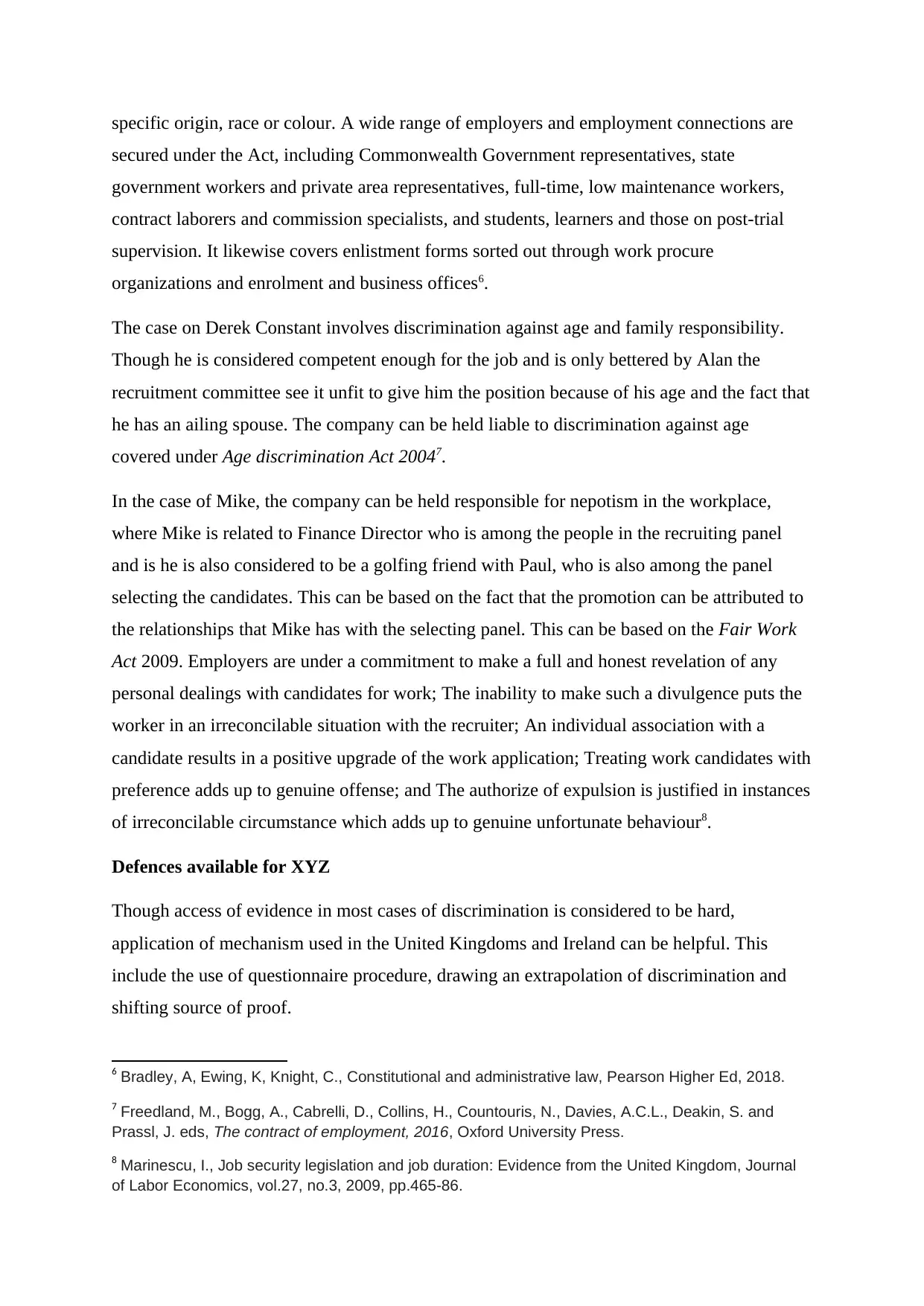
specific origin, race or colour. A wide range of employers and employment connections are
secured under the Act, including Commonwealth Government representatives, state
government workers and private area representatives, full-time, low maintenance workers,
contract laborers and commission specialists, and students, learners and those on post-trial
supervision. It likewise covers enlistment forms sorted out through work procure
organizations and enrolment and business offices6.
The case on Derek Constant involves discrimination against age and family responsibility.
Though he is considered competent enough for the job and is only bettered by Alan the
recruitment committee see it unfit to give him the position because of his age and the fact that
he has an ailing spouse. The company can be held liable to discrimination against age
covered under Age discrimination Act 20047.
In the case of Mike, the company can be held responsible for nepotism in the workplace,
where Mike is related to Finance Director who is among the people in the recruiting panel
and is he is also considered to be a golfing friend with Paul, who is also among the panel
selecting the candidates. This can be based on the fact that the promotion can be attributed to
the relationships that Mike has with the selecting panel. This can be based on the Fair Work
Act 2009. Employers are under a commitment to make a full and honest revelation of any
personal dealings with candidates for work; The inability to make such a divulgence puts the
worker in an irreconcilable situation with the recruiter; An individual association with a
candidate results in a positive upgrade of the work application; Treating work candidates with
preference adds up to genuine offense; and The authorize of expulsion is justified in instances
of irreconcilable circumstance which adds up to genuine unfortunate behaviour8.
Defences available for XYZ
Though access of evidence in most cases of discrimination is considered to be hard,
application of mechanism used in the United Kingdoms and Ireland can be helpful. This
include the use of questionnaire procedure, drawing an extrapolation of discrimination and
shifting source of proof.
6 Bradley, A, Ewing, K, Knight, C., Constitutional and administrative law, Pearson Higher Ed, 2018.
7 Freedland, M., Bogg, A., Cabrelli, D., Collins, H., Countouris, N., Davies, A.C.L., Deakin, S. and
Prassl, J. eds, The contract of employment, 2016, Oxford University Press.
8 Marinescu, I., Job security legislation and job duration: Evidence from the United Kingdom, Journal
of Labor Economics, vol.27, no.3, 2009, pp.465-86.
secured under the Act, including Commonwealth Government representatives, state
government workers and private area representatives, full-time, low maintenance workers,
contract laborers and commission specialists, and students, learners and those on post-trial
supervision. It likewise covers enlistment forms sorted out through work procure
organizations and enrolment and business offices6.
The case on Derek Constant involves discrimination against age and family responsibility.
Though he is considered competent enough for the job and is only bettered by Alan the
recruitment committee see it unfit to give him the position because of his age and the fact that
he has an ailing spouse. The company can be held liable to discrimination against age
covered under Age discrimination Act 20047.
In the case of Mike, the company can be held responsible for nepotism in the workplace,
where Mike is related to Finance Director who is among the people in the recruiting panel
and is he is also considered to be a golfing friend with Paul, who is also among the panel
selecting the candidates. This can be based on the fact that the promotion can be attributed to
the relationships that Mike has with the selecting panel. This can be based on the Fair Work
Act 2009. Employers are under a commitment to make a full and honest revelation of any
personal dealings with candidates for work; The inability to make such a divulgence puts the
worker in an irreconcilable situation with the recruiter; An individual association with a
candidate results in a positive upgrade of the work application; Treating work candidates with
preference adds up to genuine offense; and The authorize of expulsion is justified in instances
of irreconcilable circumstance which adds up to genuine unfortunate behaviour8.
Defences available for XYZ
Though access of evidence in most cases of discrimination is considered to be hard,
application of mechanism used in the United Kingdoms and Ireland can be helpful. This
include the use of questionnaire procedure, drawing an extrapolation of discrimination and
shifting source of proof.
6 Bradley, A, Ewing, K, Knight, C., Constitutional and administrative law, Pearson Higher Ed, 2018.
7 Freedland, M., Bogg, A., Cabrelli, D., Collins, H., Countouris, N., Davies, A.C.L., Deakin, S. and
Prassl, J. eds, The contract of employment, 2016, Oxford University Press.
8 Marinescu, I., Job security legislation and job duration: Evidence from the United Kingdom, Journal
of Labor Economics, vol.27, no.3, 2009, pp.465-86.
Secure Best Marks with AI Grader
Need help grading? Try our AI Grader for instant feedback on your assignments.
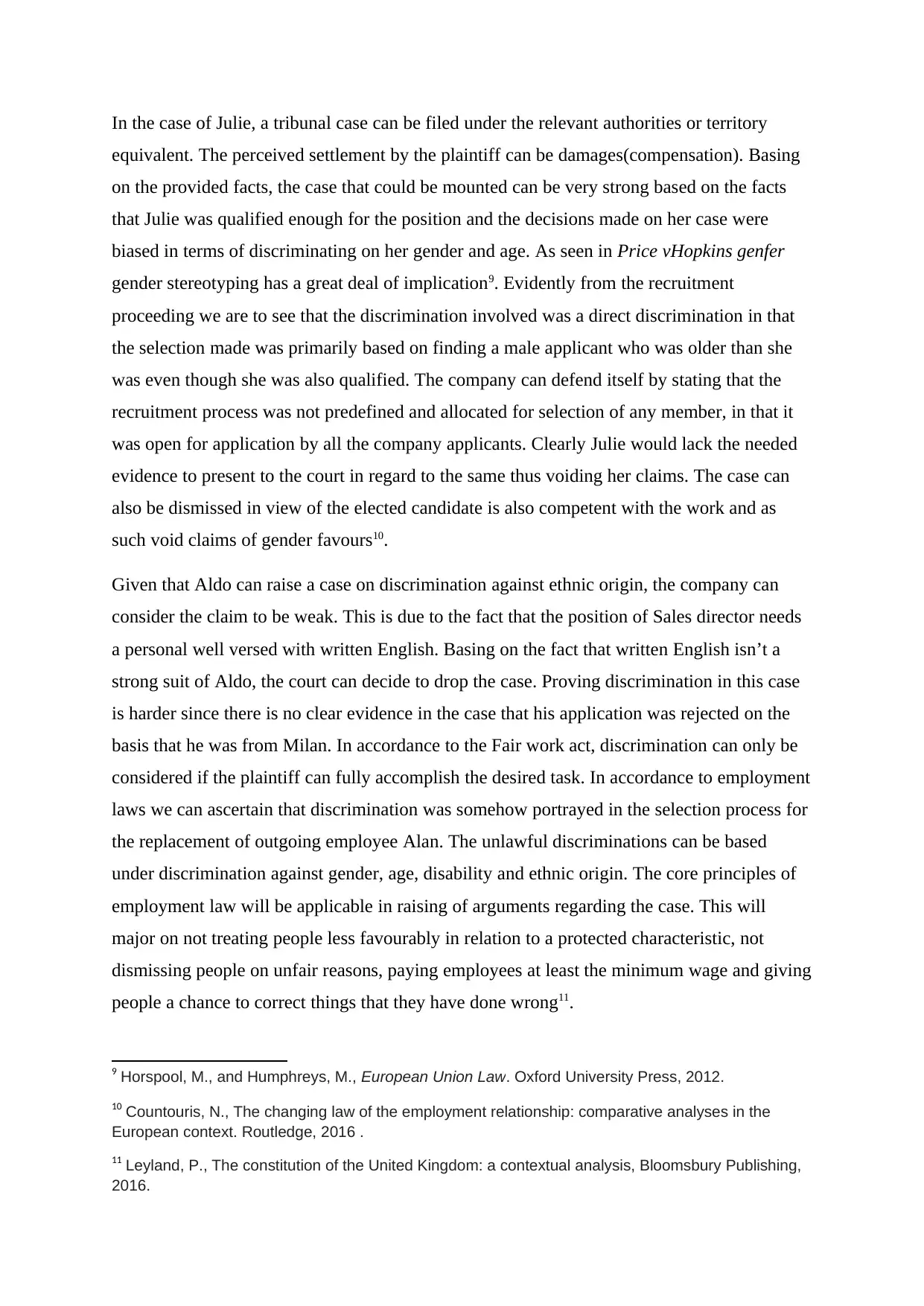
In the case of Julie, a tribunal case can be filed under the relevant authorities or territory
equivalent. The perceived settlement by the plaintiff can be damages(compensation). Basing
on the provided facts, the case that could be mounted can be very strong based on the facts
that Julie was qualified enough for the position and the decisions made on her case were
biased in terms of discriminating on her gender and age. As seen in Price vHopkins genfer
gender stereotyping has a great deal of implication9. Evidently from the recruitment
proceeding we are to see that the discrimination involved was a direct discrimination in that
the selection made was primarily based on finding a male applicant who was older than she
was even though she was also qualified. The company can defend itself by stating that the
recruitment process was not predefined and allocated for selection of any member, in that it
was open for application by all the company applicants. Clearly Julie would lack the needed
evidence to present to the court in regard to the same thus voiding her claims. The case can
also be dismissed in view of the elected candidate is also competent with the work and as
such void claims of gender favours10.
Given that Aldo can raise a case on discrimination against ethnic origin, the company can
consider the claim to be weak. This is due to the fact that the position of Sales director needs
a personal well versed with written English. Basing on the fact that written English isn’t a
strong suit of Aldo, the court can decide to drop the case. Proving discrimination in this case
is harder since there is no clear evidence in the case that his application was rejected on the
basis that he was from Milan. In accordance to the Fair work act, discrimination can only be
considered if the plaintiff can fully accomplish the desired task. In accordance to employment
laws we can ascertain that discrimination was somehow portrayed in the selection process for
the replacement of outgoing employee Alan. The unlawful discriminations can be based
under discrimination against gender, age, disability and ethnic origin. The core principles of
employment law will be applicable in raising of arguments regarding the case. This will
major on not treating people less favourably in relation to a protected characteristic, not
dismissing people on unfair reasons, paying employees at least the minimum wage and giving
people a chance to correct things that they have done wrong11.
9 Horspool, M., and Humphreys, M., European Union Law. Oxford University Press, 2012.
10 Countouris, N., The changing law of the employment relationship: comparative analyses in the
European context. Routledge, 2016 .
11 Leyland, P., The constitution of the United Kingdom: a contextual analysis, Bloomsbury Publishing,
2016.
equivalent. The perceived settlement by the plaintiff can be damages(compensation). Basing
on the provided facts, the case that could be mounted can be very strong based on the facts
that Julie was qualified enough for the position and the decisions made on her case were
biased in terms of discriminating on her gender and age. As seen in Price vHopkins genfer
gender stereotyping has a great deal of implication9. Evidently from the recruitment
proceeding we are to see that the discrimination involved was a direct discrimination in that
the selection made was primarily based on finding a male applicant who was older than she
was even though she was also qualified. The company can defend itself by stating that the
recruitment process was not predefined and allocated for selection of any member, in that it
was open for application by all the company applicants. Clearly Julie would lack the needed
evidence to present to the court in regard to the same thus voiding her claims. The case can
also be dismissed in view of the elected candidate is also competent with the work and as
such void claims of gender favours10.
Given that Aldo can raise a case on discrimination against ethnic origin, the company can
consider the claim to be weak. This is due to the fact that the position of Sales director needs
a personal well versed with written English. Basing on the fact that written English isn’t a
strong suit of Aldo, the court can decide to drop the case. Proving discrimination in this case
is harder since there is no clear evidence in the case that his application was rejected on the
basis that he was from Milan. In accordance to the Fair work act, discrimination can only be
considered if the plaintiff can fully accomplish the desired task. In accordance to employment
laws we can ascertain that discrimination was somehow portrayed in the selection process for
the replacement of outgoing employee Alan. The unlawful discriminations can be based
under discrimination against gender, age, disability and ethnic origin. The core principles of
employment law will be applicable in raising of arguments regarding the case. This will
major on not treating people less favourably in relation to a protected characteristic, not
dismissing people on unfair reasons, paying employees at least the minimum wage and giving
people a chance to correct things that they have done wrong11.
9 Horspool, M., and Humphreys, M., European Union Law. Oxford University Press, 2012.
10 Countouris, N., The changing law of the employment relationship: comparative analyses in the
European context. Routledge, 2016 .
11 Leyland, P., The constitution of the United Kingdom: a contextual analysis, Bloomsbury Publishing,
2016.
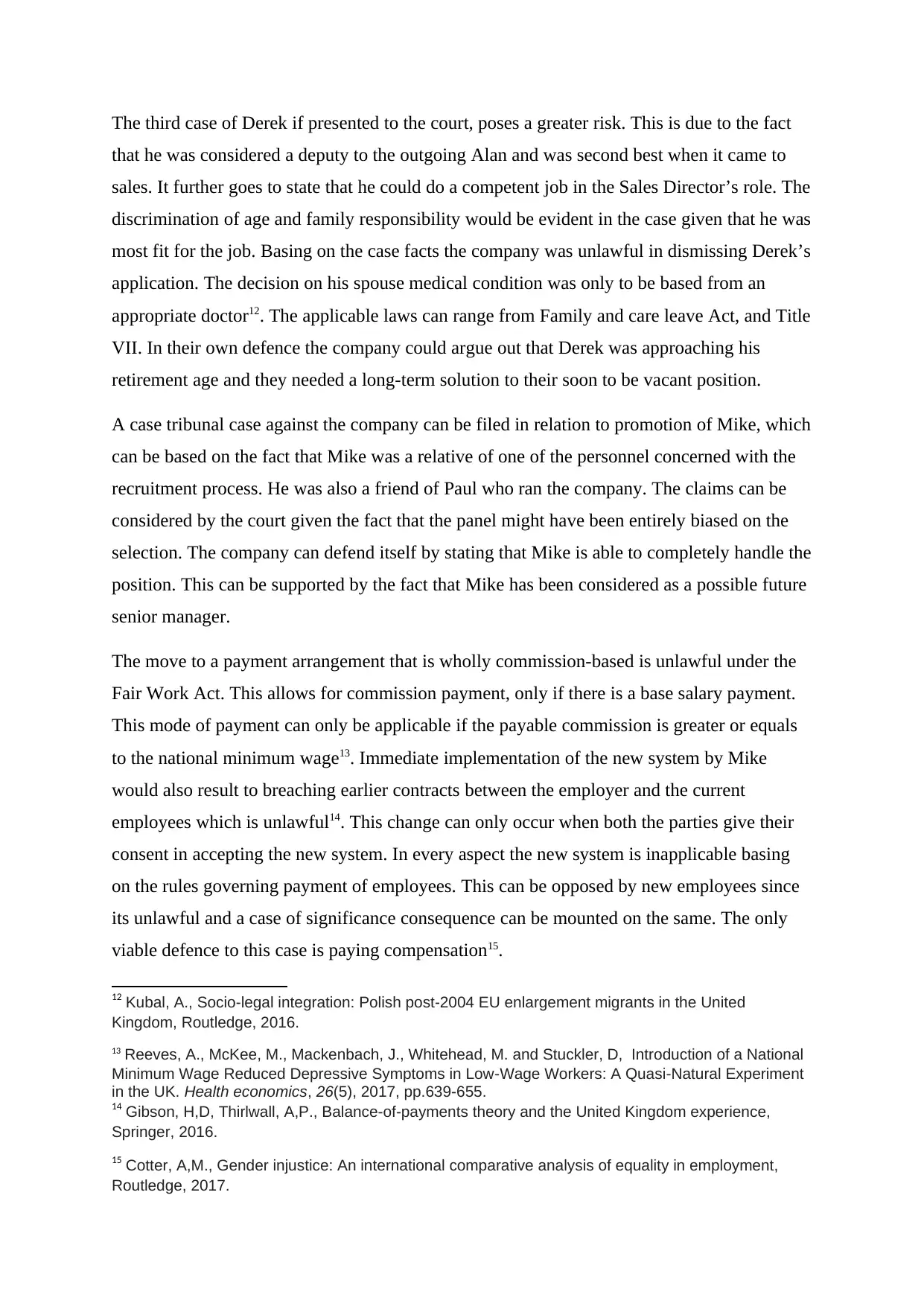
The third case of Derek if presented to the court, poses a greater risk. This is due to the fact
that he was considered a deputy to the outgoing Alan and was second best when it came to
sales. It further goes to state that he could do a competent job in the Sales Director’s role. The
discrimination of age and family responsibility would be evident in the case given that he was
most fit for the job. Basing on the case facts the company was unlawful in dismissing Derek’s
application. The decision on his spouse medical condition was only to be based from an
appropriate doctor12. The applicable laws can range from Family and care leave Act, and Title
VII. In their own defence the company could argue out that Derek was approaching his
retirement age and they needed a long-term solution to their soon to be vacant position.
A case tribunal case against the company can be filed in relation to promotion of Mike, which
can be based on the fact that Mike was a relative of one of the personnel concerned with the
recruitment process. He was also a friend of Paul who ran the company. The claims can be
considered by the court given the fact that the panel might have been entirely biased on the
selection. The company can defend itself by stating that Mike is able to completely handle the
position. This can be supported by the fact that Mike has been considered as a possible future
senior manager.
The move to a payment arrangement that is wholly commission-based is unlawful under the
Fair Work Act. This allows for commission payment, only if there is a base salary payment.
This mode of payment can only be applicable if the payable commission is greater or equals
to the national minimum wage13. Immediate implementation of the new system by Mike
would also result to breaching earlier contracts between the employer and the current
employees which is unlawful14. This change can only occur when both the parties give their
consent in accepting the new system. In every aspect the new system is inapplicable basing
on the rules governing payment of employees. This can be opposed by new employees since
its unlawful and a case of significance consequence can be mounted on the same. The only
viable defence to this case is paying compensation15.
12 Kubal, A., Socio-legal integration: Polish post-2004 EU enlargement migrants in the United
Kingdom, Routledge, 2016.
13 Reeves, A., McKee, M., Mackenbach, J., Whitehead, M. and Stuckler, D, Introduction of a National
Minimum Wage Reduced Depressive Symptoms in Low‐Wage Workers: A Quasi‐Natural Experiment
in the UK. Health economics, 26(5), 2017, pp.639-655.
14 Gibson, H,D, Thirlwall, A,P., Balance-of-payments theory and the United Kingdom experience,
Springer, 2016.
15 Cotter, A,M., Gender injustice: An international comparative analysis of equality in employment,
Routledge, 2017.
that he was considered a deputy to the outgoing Alan and was second best when it came to
sales. It further goes to state that he could do a competent job in the Sales Director’s role. The
discrimination of age and family responsibility would be evident in the case given that he was
most fit for the job. Basing on the case facts the company was unlawful in dismissing Derek’s
application. The decision on his spouse medical condition was only to be based from an
appropriate doctor12. The applicable laws can range from Family and care leave Act, and Title
VII. In their own defence the company could argue out that Derek was approaching his
retirement age and they needed a long-term solution to their soon to be vacant position.
A case tribunal case against the company can be filed in relation to promotion of Mike, which
can be based on the fact that Mike was a relative of one of the personnel concerned with the
recruitment process. He was also a friend of Paul who ran the company. The claims can be
considered by the court given the fact that the panel might have been entirely biased on the
selection. The company can defend itself by stating that Mike is able to completely handle the
position. This can be supported by the fact that Mike has been considered as a possible future
senior manager.
The move to a payment arrangement that is wholly commission-based is unlawful under the
Fair Work Act. This allows for commission payment, only if there is a base salary payment.
This mode of payment can only be applicable if the payable commission is greater or equals
to the national minimum wage13. Immediate implementation of the new system by Mike
would also result to breaching earlier contracts between the employer and the current
employees which is unlawful14. This change can only occur when both the parties give their
consent in accepting the new system. In every aspect the new system is inapplicable basing
on the rules governing payment of employees. This can be opposed by new employees since
its unlawful and a case of significance consequence can be mounted on the same. The only
viable defence to this case is paying compensation15.
12 Kubal, A., Socio-legal integration: Polish post-2004 EU enlargement migrants in the United
Kingdom, Routledge, 2016.
13 Reeves, A., McKee, M., Mackenbach, J., Whitehead, M. and Stuckler, D, Introduction of a National
Minimum Wage Reduced Depressive Symptoms in Low‐Wage Workers: A Quasi‐Natural Experiment
in the UK. Health economics, 26(5), 2017, pp.639-655.
14 Gibson, H,D, Thirlwall, A,P., Balance-of-payments theory and the United Kingdom experience,
Springer, 2016.
15 Cotter, A,M., Gender injustice: An international comparative analysis of equality in employment,
Routledge, 2017.
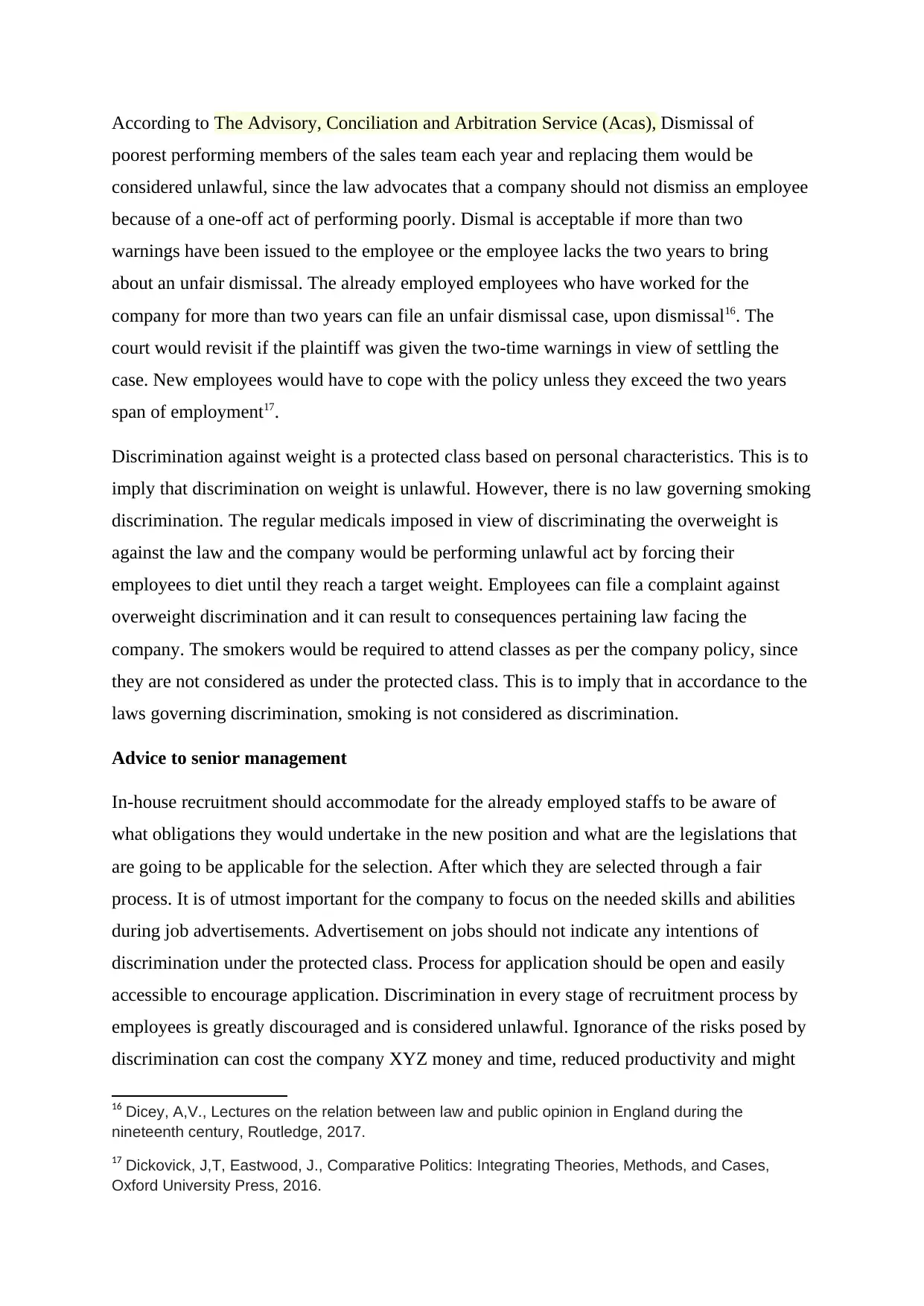
According to The Advisory, Conciliation and Arbitration Service (Acas), Dismissal of
poorest performing members of the sales team each year and replacing them would be
considered unlawful, since the law advocates that a company should not dismiss an employee
because of a one-off act of performing poorly. Dismal is acceptable if more than two
warnings have been issued to the employee or the employee lacks the two years to bring
about an unfair dismissal. The already employed employees who have worked for the
company for more than two years can file an unfair dismissal case, upon dismissal16. The
court would revisit if the plaintiff was given the two-time warnings in view of settling the
case. New employees would have to cope with the policy unless they exceed the two years
span of employment17.
Discrimination against weight is a protected class based on personal characteristics. This is to
imply that discrimination on weight is unlawful. However, there is no law governing smoking
discrimination. The regular medicals imposed in view of discriminating the overweight is
against the law and the company would be performing unlawful act by forcing their
employees to diet until they reach a target weight. Employees can file a complaint against
overweight discrimination and it can result to consequences pertaining law facing the
company. The smokers would be required to attend classes as per the company policy, since
they are not considered as under the protected class. This is to imply that in accordance to the
laws governing discrimination, smoking is not considered as discrimination.
Advice to senior management
In-house recruitment should accommodate for the already employed staffs to be aware of
what obligations they would undertake in the new position and what are the legislations that
are going to be applicable for the selection. After which they are selected through a fair
process. It is of utmost important for the company to focus on the needed skills and abilities
during job advertisements. Advertisement on jobs should not indicate any intentions of
discrimination under the protected class. Process for application should be open and easily
accessible to encourage application. Discrimination in every stage of recruitment process by
employees is greatly discouraged and is considered unlawful. Ignorance of the risks posed by
discrimination can cost the company XYZ money and time, reduced productivity and might
16 Dicey, A,V., Lectures on the relation between law and public opinion in England during the
nineteenth century, Routledge, 2017.
17 Dickovick, J,T, Eastwood, J., Comparative Politics: Integrating Theories, Methods, and Cases,
Oxford University Press, 2016.
poorest performing members of the sales team each year and replacing them would be
considered unlawful, since the law advocates that a company should not dismiss an employee
because of a one-off act of performing poorly. Dismal is acceptable if more than two
warnings have been issued to the employee or the employee lacks the two years to bring
about an unfair dismissal. The already employed employees who have worked for the
company for more than two years can file an unfair dismissal case, upon dismissal16. The
court would revisit if the plaintiff was given the two-time warnings in view of settling the
case. New employees would have to cope with the policy unless they exceed the two years
span of employment17.
Discrimination against weight is a protected class based on personal characteristics. This is to
imply that discrimination on weight is unlawful. However, there is no law governing smoking
discrimination. The regular medicals imposed in view of discriminating the overweight is
against the law and the company would be performing unlawful act by forcing their
employees to diet until they reach a target weight. Employees can file a complaint against
overweight discrimination and it can result to consequences pertaining law facing the
company. The smokers would be required to attend classes as per the company policy, since
they are not considered as under the protected class. This is to imply that in accordance to the
laws governing discrimination, smoking is not considered as discrimination.
Advice to senior management
In-house recruitment should accommodate for the already employed staffs to be aware of
what obligations they would undertake in the new position and what are the legislations that
are going to be applicable for the selection. After which they are selected through a fair
process. It is of utmost important for the company to focus on the needed skills and abilities
during job advertisements. Advertisement on jobs should not indicate any intentions of
discrimination under the protected class. Process for application should be open and easily
accessible to encourage application. Discrimination in every stage of recruitment process by
employees is greatly discouraged and is considered unlawful. Ignorance of the risks posed by
discrimination can cost the company XYZ money and time, reduced productivity and might
16 Dicey, A,V., Lectures on the relation between law and public opinion in England during the
nineteenth century, Routledge, 2017.
17 Dickovick, J,T, Eastwood, J., Comparative Politics: Integrating Theories, Methods, and Cases,
Oxford University Press, 2016.
Paraphrase This Document
Need a fresh take? Get an instant paraphrase of this document with our AI Paraphraser
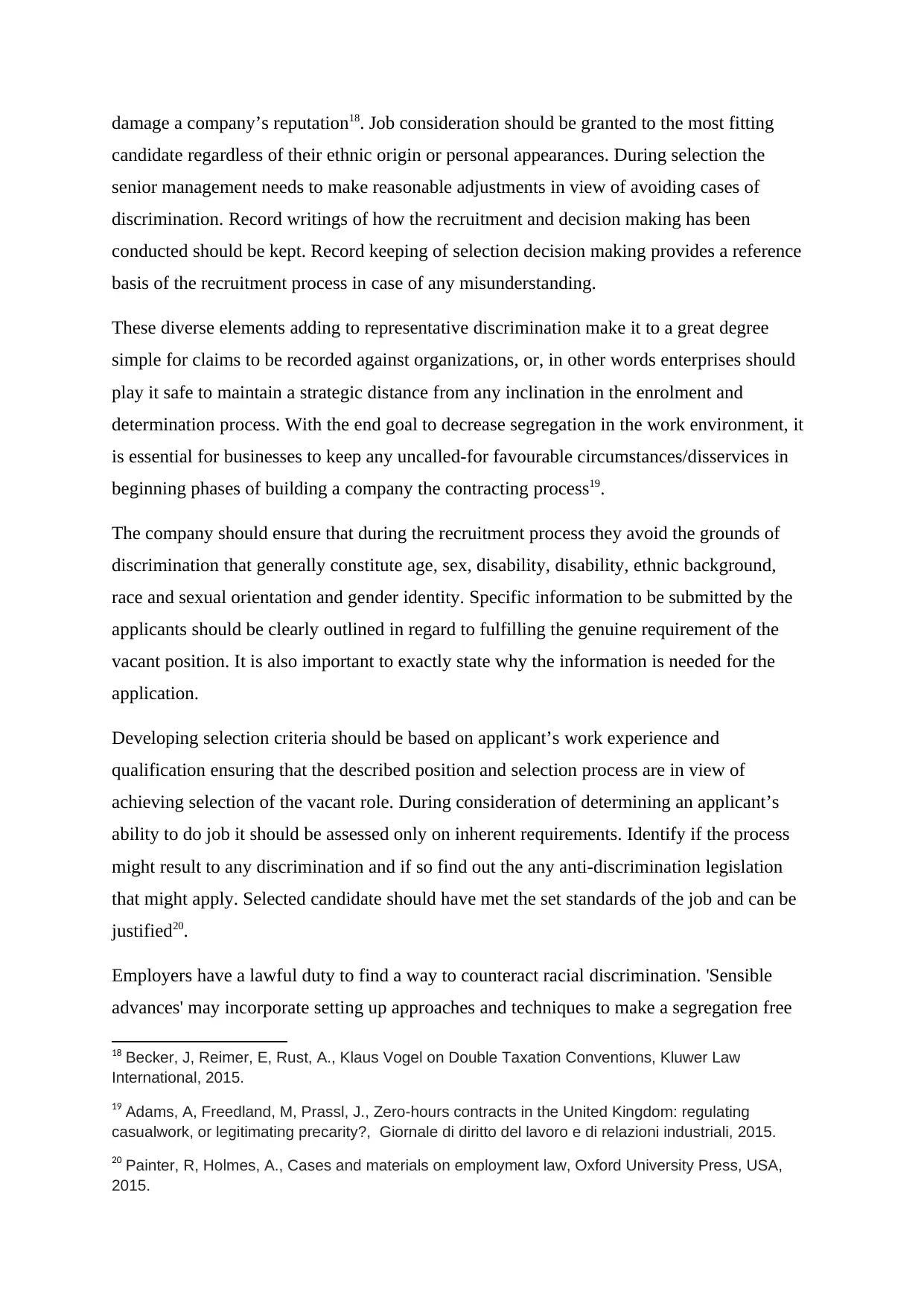
damage a company’s reputation18. Job consideration should be granted to the most fitting
candidate regardless of their ethnic origin or personal appearances. During selection the
senior management needs to make reasonable adjustments in view of avoiding cases of
discrimination. Record writings of how the recruitment and decision making has been
conducted should be kept. Record keeping of selection decision making provides a reference
basis of the recruitment process in case of any misunderstanding.
These diverse elements adding to representative discrimination make it to a great degree
simple for claims to be recorded against organizations, or, in other words enterprises should
play it safe to maintain a strategic distance from any inclination in the enrolment and
determination process. With the end goal to decrease segregation in the work environment, it
is essential for businesses to keep any uncalled-for favourable circumstances/disservices in
beginning phases of building a company the contracting process19.
The company should ensure that during the recruitment process they avoid the grounds of
discrimination that generally constitute age, sex, disability, disability, ethnic background,
race and sexual orientation and gender identity. Specific information to be submitted by the
applicants should be clearly outlined in regard to fulfilling the genuine requirement of the
vacant position. It is also important to exactly state why the information is needed for the
application.
Developing selection criteria should be based on applicant’s work experience and
qualification ensuring that the described position and selection process are in view of
achieving selection of the vacant role. During consideration of determining an applicant’s
ability to do job it should be assessed only on inherent requirements. Identify if the process
might result to any discrimination and if so find out the any anti-discrimination legislation
that might apply. Selected candidate should have met the set standards of the job and can be
justified20.
Employers have a lawful duty to find a way to counteract racial discrimination. 'Sensible
advances' may incorporate setting up approaches and techniques to make a segregation free
18 Becker, J, Reimer, E, Rust, A., Klaus Vogel on Double Taxation Conventions, Kluwer Law
International, 2015.
19 Adams, A, Freedland, M, Prassl, J., Zero-hours contracts in the United Kingdom: regulating
casualwork, or legitimating precarity?, Giornale di diritto del lavoro e di relazioni industriali, 2015.
20 Painter, R, Holmes, A., Cases and materials on employment law, Oxford University Press, USA,
2015.
candidate regardless of their ethnic origin or personal appearances. During selection the
senior management needs to make reasonable adjustments in view of avoiding cases of
discrimination. Record writings of how the recruitment and decision making has been
conducted should be kept. Record keeping of selection decision making provides a reference
basis of the recruitment process in case of any misunderstanding.
These diverse elements adding to representative discrimination make it to a great degree
simple for claims to be recorded against organizations, or, in other words enterprises should
play it safe to maintain a strategic distance from any inclination in the enrolment and
determination process. With the end goal to decrease segregation in the work environment, it
is essential for businesses to keep any uncalled-for favourable circumstances/disservices in
beginning phases of building a company the contracting process19.
The company should ensure that during the recruitment process they avoid the grounds of
discrimination that generally constitute age, sex, disability, disability, ethnic background,
race and sexual orientation and gender identity. Specific information to be submitted by the
applicants should be clearly outlined in regard to fulfilling the genuine requirement of the
vacant position. It is also important to exactly state why the information is needed for the
application.
Developing selection criteria should be based on applicant’s work experience and
qualification ensuring that the described position and selection process are in view of
achieving selection of the vacant role. During consideration of determining an applicant’s
ability to do job it should be assessed only on inherent requirements. Identify if the process
might result to any discrimination and if so find out the any anti-discrimination legislation
that might apply. Selected candidate should have met the set standards of the job and can be
justified20.
Employers have a lawful duty to find a way to counteract racial discrimination. 'Sensible
advances' may incorporate setting up approaches and techniques to make a segregation free
18 Becker, J, Reimer, E, Rust, A., Klaus Vogel on Double Taxation Conventions, Kluwer Law
International, 2015.
19 Adams, A, Freedland, M, Prassl, J., Zero-hours contracts in the United Kingdom: regulating
casualwork, or legitimating precarity?, Giornale di diritto del lavoro e di relazioni industriali, 2015.
20 Painter, R, Holmes, A., Cases and materials on employment law, Oxford University Press, USA,
2015.
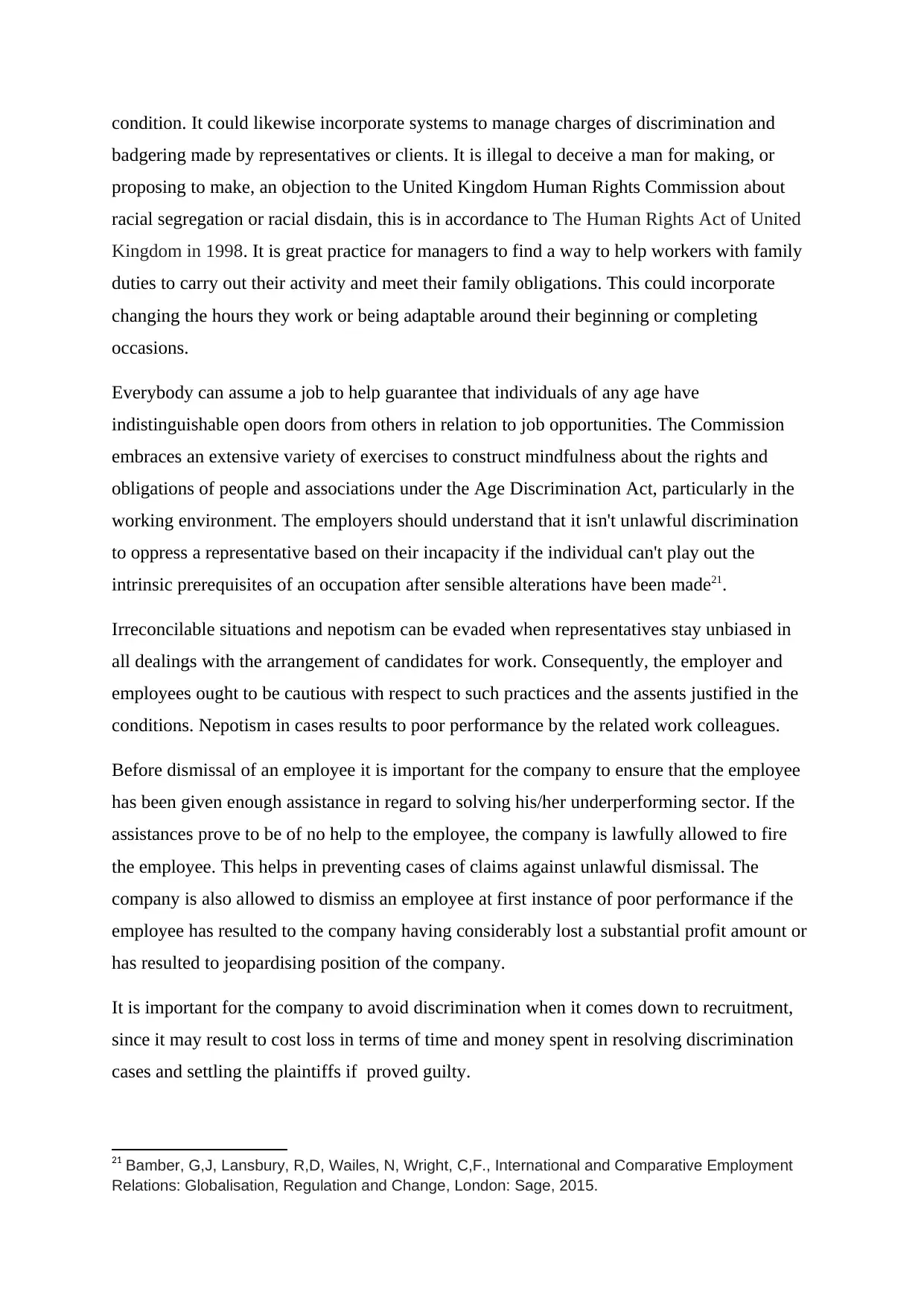
condition. It could likewise incorporate systems to manage charges of discrimination and
badgering made by representatives or clients. It is illegal to deceive a man for making, or
proposing to make, an objection to the United Kingdom Human Rights Commission about
racial segregation or racial disdain, this is in accordance to The Human Rights Act of United
Kingdom in 1998. It is great practice for managers to find a way to help workers with family
duties to carry out their activity and meet their family obligations. This could incorporate
changing the hours they work or being adaptable around their beginning or completing
occasions.
Everybody can assume a job to help guarantee that individuals of any age have
indistinguishable open doors from others in relation to job opportunities. The Commission
embraces an extensive variety of exercises to construct mindfulness about the rights and
obligations of people and associations under the Age Discrimination Act, particularly in the
working environment. The employers should understand that it isn't unlawful discrimination
to oppress a representative based on their incapacity if the individual can't play out the
intrinsic prerequisites of an occupation after sensible alterations have been made21.
Irreconcilable situations and nepotism can be evaded when representatives stay unbiased in
all dealings with the arrangement of candidates for work. Consequently, the employer and
employees ought to be cautious with respect to such practices and the assents justified in the
conditions. Nepotism in cases results to poor performance by the related work colleagues.
Before dismissal of an employee it is important for the company to ensure that the employee
has been given enough assistance in regard to solving his/her underperforming sector. If the
assistances prove to be of no help to the employee, the company is lawfully allowed to fire
the employee. This helps in preventing cases of claims against unlawful dismissal. The
company is also allowed to dismiss an employee at first instance of poor performance if the
employee has resulted to the company having considerably lost a substantial profit amount or
has resulted to jeopardising position of the company.
It is important for the company to avoid discrimination when it comes down to recruitment,
since it may result to cost loss in terms of time and money spent in resolving discrimination
cases and settling the plaintiffs if proved guilty.
21 Bamber, G,J, Lansbury, R,D, Wailes, N, Wright, C,F., International and Comparative Employment
Relations: Globalisation, Regulation and Change, London: Sage, 2015.
badgering made by representatives or clients. It is illegal to deceive a man for making, or
proposing to make, an objection to the United Kingdom Human Rights Commission about
racial segregation or racial disdain, this is in accordance to The Human Rights Act of United
Kingdom in 1998. It is great practice for managers to find a way to help workers with family
duties to carry out their activity and meet their family obligations. This could incorporate
changing the hours they work or being adaptable around their beginning or completing
occasions.
Everybody can assume a job to help guarantee that individuals of any age have
indistinguishable open doors from others in relation to job opportunities. The Commission
embraces an extensive variety of exercises to construct mindfulness about the rights and
obligations of people and associations under the Age Discrimination Act, particularly in the
working environment. The employers should understand that it isn't unlawful discrimination
to oppress a representative based on their incapacity if the individual can't play out the
intrinsic prerequisites of an occupation after sensible alterations have been made21.
Irreconcilable situations and nepotism can be evaded when representatives stay unbiased in
all dealings with the arrangement of candidates for work. Consequently, the employer and
employees ought to be cautious with respect to such practices and the assents justified in the
conditions. Nepotism in cases results to poor performance by the related work colleagues.
Before dismissal of an employee it is important for the company to ensure that the employee
has been given enough assistance in regard to solving his/her underperforming sector. If the
assistances prove to be of no help to the employee, the company is lawfully allowed to fire
the employee. This helps in preventing cases of claims against unlawful dismissal. The
company is also allowed to dismiss an employee at first instance of poor performance if the
employee has resulted to the company having considerably lost a substantial profit amount or
has resulted to jeopardising position of the company.
It is important for the company to avoid discrimination when it comes down to recruitment,
since it may result to cost loss in terms of time and money spent in resolving discrimination
cases and settling the plaintiffs if proved guilty.
21 Bamber, G,J, Lansbury, R,D, Wailes, N, Wright, C,F., International and Comparative Employment
Relations: Globalisation, Regulation and Change, London: Sage, 2015.

Secure Best Marks with AI Grader
Need help grading? Try our AI Grader for instant feedback on your assignments.
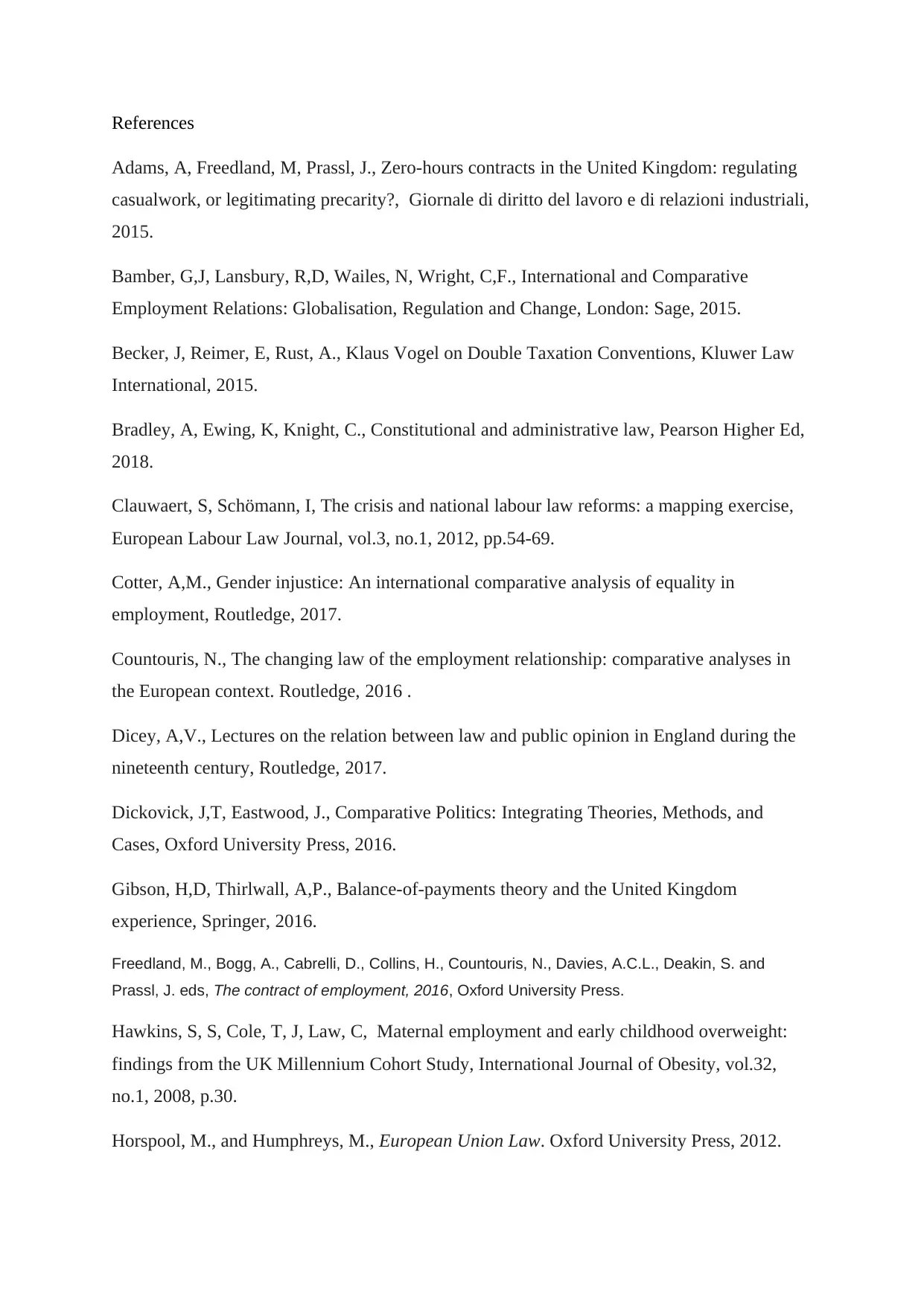
References
Adams, A, Freedland, M, Prassl, J., Zero-hours contracts in the United Kingdom: regulating
casualwork, or legitimating precarity?, Giornale di diritto del lavoro e di relazioni industriali,
2015.
Bamber, G,J, Lansbury, R,D, Wailes, N, Wright, C,F., International and Comparative
Employment Relations: Globalisation, Regulation and Change, London: Sage, 2015.
Becker, J, Reimer, E, Rust, A., Klaus Vogel on Double Taxation Conventions, Kluwer Law
International, 2015.
Bradley, A, Ewing, K, Knight, C., Constitutional and administrative law, Pearson Higher Ed,
2018.
Clauwaert, S, Schömann, I, The crisis and national labour law reforms: a mapping exercise,
European Labour Law Journal, vol.3, no.1, 2012, pp.54-69.
Cotter, A,M., Gender injustice: An international comparative analysis of equality in
employment, Routledge, 2017.
Countouris, N., The changing law of the employment relationship: comparative analyses in
the European context. Routledge, 2016 .
Dicey, A,V., Lectures on the relation between law and public opinion in England during the
nineteenth century, Routledge, 2017.
Dickovick, J,T, Eastwood, J., Comparative Politics: Integrating Theories, Methods, and
Cases, Oxford University Press, 2016.
Gibson, H,D, Thirlwall, A,P., Balance-of-payments theory and the United Kingdom
experience, Springer, 2016.
Freedland, M., Bogg, A., Cabrelli, D., Collins, H., Countouris, N., Davies, A.C.L., Deakin, S. and
Prassl, J. eds, The contract of employment, 2016, Oxford University Press.
Hawkins, S, S, Cole, T, J, Law, C, Maternal employment and early childhood overweight:
findings from the UK Millennium Cohort Study, International Journal of Obesity, vol.32,
no.1, 2008, p.30.
Horspool, M., and Humphreys, M., European Union Law. Oxford University Press, 2012.
Adams, A, Freedland, M, Prassl, J., Zero-hours contracts in the United Kingdom: regulating
casualwork, or legitimating precarity?, Giornale di diritto del lavoro e di relazioni industriali,
2015.
Bamber, G,J, Lansbury, R,D, Wailes, N, Wright, C,F., International and Comparative
Employment Relations: Globalisation, Regulation and Change, London: Sage, 2015.
Becker, J, Reimer, E, Rust, A., Klaus Vogel on Double Taxation Conventions, Kluwer Law
International, 2015.
Bradley, A, Ewing, K, Knight, C., Constitutional and administrative law, Pearson Higher Ed,
2018.
Clauwaert, S, Schömann, I, The crisis and national labour law reforms: a mapping exercise,
European Labour Law Journal, vol.3, no.1, 2012, pp.54-69.
Cotter, A,M., Gender injustice: An international comparative analysis of equality in
employment, Routledge, 2017.
Countouris, N., The changing law of the employment relationship: comparative analyses in
the European context. Routledge, 2016 .
Dicey, A,V., Lectures on the relation between law and public opinion in England during the
nineteenth century, Routledge, 2017.
Dickovick, J,T, Eastwood, J., Comparative Politics: Integrating Theories, Methods, and
Cases, Oxford University Press, 2016.
Gibson, H,D, Thirlwall, A,P., Balance-of-payments theory and the United Kingdom
experience, Springer, 2016.
Freedland, M., Bogg, A., Cabrelli, D., Collins, H., Countouris, N., Davies, A.C.L., Deakin, S. and
Prassl, J. eds, The contract of employment, 2016, Oxford University Press.
Hawkins, S, S, Cole, T, J, Law, C, Maternal employment and early childhood overweight:
findings from the UK Millennium Cohort Study, International Journal of Obesity, vol.32,
no.1, 2008, p.30.
Horspool, M., and Humphreys, M., European Union Law. Oxford University Press, 2012.
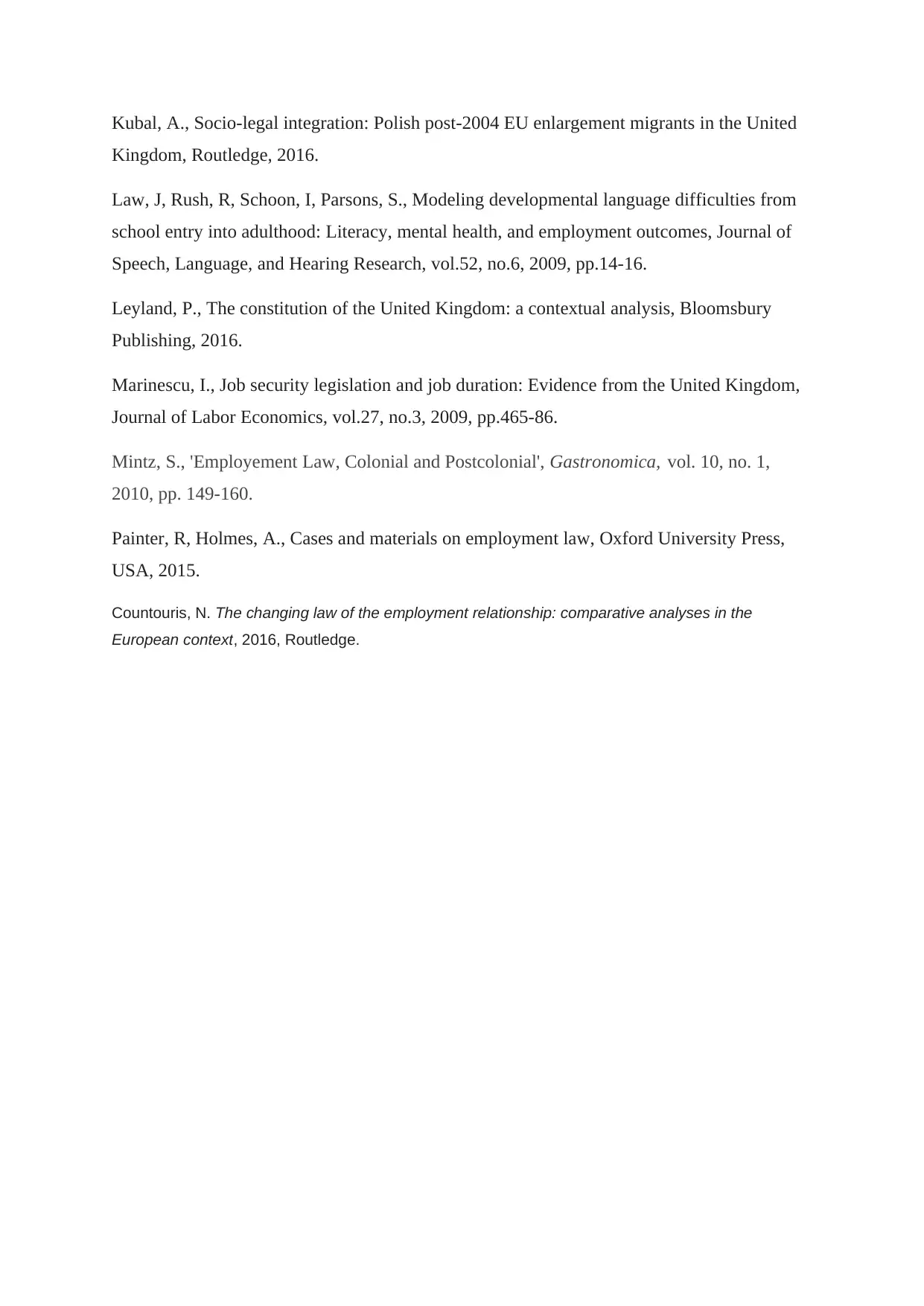
Kubal, A., Socio-legal integration: Polish post-2004 EU enlargement migrants in the United
Kingdom, Routledge, 2016.
Law, J, Rush, R, Schoon, I, Parsons, S., Modeling developmental language difficulties from
school entry into adulthood: Literacy, mental health, and employment outcomes, Journal of
Speech, Language, and Hearing Research, vol.52, no.6, 2009, pp.14-16.
Leyland, P., The constitution of the United Kingdom: a contextual analysis, Bloomsbury
Publishing, 2016.
Marinescu, I., Job security legislation and job duration: Evidence from the United Kingdom,
Journal of Labor Economics, vol.27, no.3, 2009, pp.465-86.
Mintz, S., 'Employement Law, Colonial and Postcolonial', Gastronomica, vol. 10, no. 1,
2010, pp. 149-160.
Painter, R, Holmes, A., Cases and materials on employment law, Oxford University Press,
USA, 2015.
Countouris, N. The changing law of the employment relationship: comparative analyses in the
European context, 2016, Routledge.
Kingdom, Routledge, 2016.
Law, J, Rush, R, Schoon, I, Parsons, S., Modeling developmental language difficulties from
school entry into adulthood: Literacy, mental health, and employment outcomes, Journal of
Speech, Language, and Hearing Research, vol.52, no.6, 2009, pp.14-16.
Leyland, P., The constitution of the United Kingdom: a contextual analysis, Bloomsbury
Publishing, 2016.
Marinescu, I., Job security legislation and job duration: Evidence from the United Kingdom,
Journal of Labor Economics, vol.27, no.3, 2009, pp.465-86.
Mintz, S., 'Employement Law, Colonial and Postcolonial', Gastronomica, vol. 10, no. 1,
2010, pp. 149-160.
Painter, R, Holmes, A., Cases and materials on employment law, Oxford University Press,
USA, 2015.
Countouris, N. The changing law of the employment relationship: comparative analyses in the
European context, 2016, Routledge.
1 out of 12
Related Documents
Your All-in-One AI-Powered Toolkit for Academic Success.
+13062052269
info@desklib.com
Available 24*7 on WhatsApp / Email
![[object Object]](/_next/static/media/star-bottom.7253800d.svg)
Unlock your academic potential
© 2024 | Zucol Services PVT LTD | All rights reserved.





